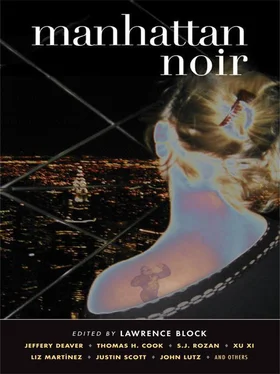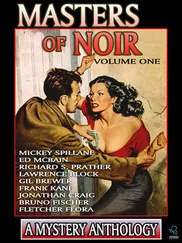Lawrence Block - Manhattan Noir
Здесь есть возможность читать онлайн «Lawrence Block - Manhattan Noir» весь текст электронной книги совершенно бесплатно (целиком полную версию без сокращений). В некоторых случаях можно слушать аудио, скачать через торрент в формате fb2 и присутствует краткое содержание. Жанр: Триллер, на английском языке. Описание произведения, (предисловие) а так же отзывы посетителей доступны на портале библиотеки ЛибКат.
- Название:Manhattan Noir
- Автор:
- Жанр:
- Год:неизвестен
- ISBN:нет данных
- Рейтинг книги:3 / 5. Голосов: 1
-
Избранное:Добавить в избранное
- Отзывы:
-
Ваша оценка:
- 60
- 1
- 2
- 3
- 4
- 5
Manhattan Noir: краткое содержание, описание и аннотация
Предлагаем к чтению аннотацию, описание, краткое содержание или предисловие (зависит от того, что написал сам автор книги «Manhattan Noir»). Если вы не нашли необходимую информацию о книге — напишите в комментариях, мы постараемся отыскать её.
Manhattan Noir — читать онлайн бесплатно полную книгу (весь текст) целиком
Ниже представлен текст книги, разбитый по страницам. Система сохранения места последней прочитанной страницы, позволяет с удобством читать онлайн бесплатно книгу «Manhattan Noir», без необходимости каждый раз заново искать на чём Вы остановились. Поставьте закладку, и сможете в любой момент перейти на страницу, на которой закончили чтение.
Интервал:
Закладка:
“Smile, will you?” Sara hissed, just before we made our entrance. “Don’t be such a dog face. Think Astaire.”
We did “Dancing in the Dark.” Sara was this tiny brunette, graceful as sin. In her white ball gown, fitted to her gorgeous figure, she was stunning. I was in tux tails, my hair pinned tightly in a net, a mustache pasted on for effect, feeling absurd. Sara was a strong dancer, but she hammed things up too much. Every dip swooped a bit too low, every turn was overdone. Friends applauded, but I knew we weren’t much above passable.
Later, while removing makeup, I looked up in the mirror and saw him. He wasn’t as young as he appeared onstage. He pressed both hands down on my shoulders and studied my face. “Do you ever dance the lady’s part?” His voice resonated. Baritone.
Nodding and shaking my head simultaneously, I stammered, “Sometimes.”
“Come on, then.” Taking my hand, he led me onstage. In my tux shirt and tights, I looked ridiculous, but Ron didn’t seem to care as we stood side by side, arms outstretched, my hand in his. I was the taller, and nervous.
“Dancing in the Dark” came on.
“Follow me,” he commanded.
My feet flowed. It was better than magic, because all of me danced, guided by heaven and his lead. When the music faded, it segued to “In the Mood.” His hands gripped my waist and he swung me in the air. A perfect partner, confident without being bossy, leading without stifling my movements. When we finished, the applause went on for a long, long time.
Onstage, I smiled at him, exhilarated, my heart pounding from exhaustion. Ron had barely broken a sweat. He pulled me toward him in a final twirl. “What’s your name?” he asked. His eyes were a deep blue-green, as deep as the ocean, only deeper.
I quit school and followed him to New York. He was thirty, the senior member in the troupe.
“A dancer?!” my father screamed over intercontinental telephone wires. “You’re living with a baahk gwai dancer?
What are you, crazy?”
“But you married one. Or at least, a half- baahk gwai . I just wanted you to know.”
“You’ll get no more money from me.”
“I don’t need your money. I can work.”
“Doing what? Shining his shoes? What do you expect to make without a college degree?”
I hung up. Ron never got to speak to him.
That was the last time I communicated with my family.
What do you suppose Mother would have said?
I remind you of your sister? Another funny face, huh? Everything comes back to family, kid. We all start there, even if we end up someplace remote. Like Ron. Despite his step-dad, who beat him up and hadn’t a clue, calling him a fag and all, he still thought about his mom. Oh, he’d never admit it, but I knew. Every Mother’s Day, he used to cry in his sleep, like clockwork.
Ron and I got married six months later.
Life was great. He scored tickets to Broadway shows because he knew people in the business. Ron had tons of friends.
He was like this solar system, burning bright, in whose orbit everyone sparkled and spun. He found places to perform, way off-Broadway, all across the country, even in Alaska, while other dancers waited tables or collected welfare. “I’ve got to dance,” he said. “Doesn’t matter how or where.”
We did dance contests and exhibitions for money whenever he was between real gigs. Other than that, we didn’t work together much. His act, the dance of his heart, was solo. Money was tight, but that never mattered because I loved him and we were rent-controlled. He used to work a lot then, going to every audition, trying for the big break. Such energy! “Disco won’t last,” he predicted. “It’ll bore itself to death. You wait and see.”
We talked. I told him all about my mother, about my Tiffany’s “wedding,” about her crying with Audrey Hepburn. Sometimes, talking made me weepy. He’d hold me until I calmed. Blood talk, he called it. Healing that scabs the pain.
After two years in New York, I took a job as a typist and filing clerk. It was way more lucrative than dancing and had health insurance. Ron didn’t want me to do it. “What about your career? You’re a good dancer when you try.”
“You dance,” I replied. “I’ll feed us. Anyway, we’ll still do the contests.”
He picked me up, effortlessly. “Lazybones. Always wanting the easy way.”
Up in the air, I laughed. “Life doesn’t have to be tough all the time.”
“Then what would you say if I tossed you out the window?” He swung me horizontal and held me there.
“Don’t you dare.”
He gave up when he saw I wouldn’t budge. That was Ron: never made me do anything against my will. As long as he was our star, I was happy.
Besides, I liked shining his tap shoes. His feet were small and elegant, as if they’d been bound and sculpted to dance from the womb.
This rock? It’s fake. You think I’d be dancing if it wasn’t?
After I heard about Audrey yesterday, I hauled myself up to Tiffany’s. Some things you just do. Colorless things, diamonds.
Don’t know what Mother saw in them. At least she loved me in her own silly way. Ron was right about that. He was right about a lot, especially love. He said deep down, my father loved me because I was his flesh and blood. His own father had been a dancer, but died when Ron was eight. So he knew all about what he called the “empty spaces of the heart.”
But Ron was wrong about A-Ba. All these years and he’s never once tried to find me, I don’t think.
When Audrey Hepburn made her comeback in ’76, it was all Ron and I talked about.
We’d missed her. I’d seen every one of her movies, in memory of Mother, but Ron liked her too. She looked pretty good for her age. You know, if you look at her face front, she could almost pass for Eurasian.
That year, I dyed my hair and eyebrows coal-black, and cut a young-Audrey bob. Ron said it made me look exotic.
All the guys at work noticed. That was also when I started wearing makeup every day.
Funny stuff, makeup. One reason I never took performing too seriously was because I didn’t like all that stage goo.
Ron was tireless and careful about his; he needed to hide the lines. Mother wore makeup like it wasn’t there, long before the natural look. Her foundation and powder blended into the skin tones of her neck, unlike women who didn’t match their complexion properly and looked as if they’d severed and reattached their heads. She painted on eyeliner with a brush, rapidly, expertly, like an artist, but never used eye shadow. “Women with blue lids,” she declared disdainfully, “look frostbitten.”
Letting Ron pluck my eyebrows was a revelation. “You see, you do have eyes,” he said. “They were hidden by all that bushy fuzz.” With a little eye liner, my eyes became wider, brighter, more open.
I smiled at people now, instead of looking down all the time. I even admitted my feet were not too big. As Ron said, seven and a half is an average size in America. I began wearing stylishly nostalgic dresses from secondhand stores. Ron loved my quirky new look. “Lady fair,” he declaimed, “you put the stars and models to shame!”
That was the happiest time of my entire life. I felt elegant, even graceful.
Trust me, I don’t talk to just anyone. It’s not like I tell every writer who asks. What, you didn’t think you were the first, did you?
I started dancing here because welfare ran out. After getting laid off, it was great not working for a while. Like vacation. I loved playing housewife and not having to answer to anyone. Ron said not to worry about getting another job, something would turn up. He even suggested auditioning. But at twenty-eight, I felt silly competing with the kids. Wouldn’t say that to him, though. Why hurt his feelings?
Читать дальшеИнтервал:
Закладка:
Похожие книги на «Manhattan Noir»
Представляем Вашему вниманию похожие книги на «Manhattan Noir» списком для выбора. Мы отобрали схожую по названию и смыслу литературу в надежде предоставить читателям больше вариантов отыскать новые, интересные, ещё непрочитанные произведения.
Обсуждение, отзывы о книге «Manhattan Noir» и просто собственные мнения читателей. Оставьте ваши комментарии, напишите, что Вы думаете о произведении, его смысле или главных героях. Укажите что конкретно понравилось, а что нет, и почему Вы так считаете.












